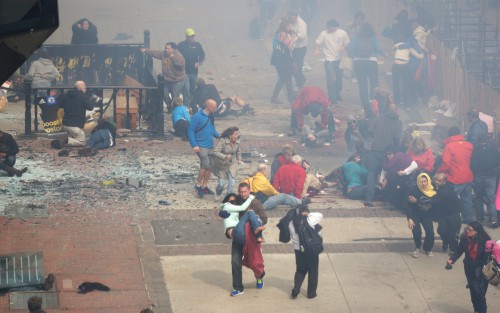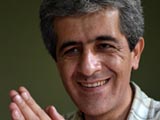The Day I Was Almost a Victim of Terrorism
by Yaghoub Yadali / May 2, 2014 / No comments
Remembering the Boston Bombing

Two bombs exploded at the 2013 Boston Marathon, killing 3 people, and injuring approximately 264 others. Photo: Wikimedia Commons
Last year, when I lived in Cambridge, Massachusetts I decided to visit Boston and see the oldest marathon in the world . I thought it would be memorable and exciting. In addition, because I wanted to get to know American culture, I participated in many events during my time in Boston, including Independence Day, the Fisherman’s Feast in the Italian neighborhood, and so on. I took many pictures and talked to all kinds of people throughout.

- “Enemy…terrorism…nuclear bomb…war.” These words are often used by American media to describe Iran. The image the media presents is often hazy, incomplete, and distorted. The political and military aspects of my country are covered mainly in a negative light.
- In Under Eastern Eyes (I have adopted the name from the novel Under Western Eyes by Joseph Conrad), I will write about those topics which American media either cannot or does not want to talk about. The emphasis will be on social and cultural aspects of Iran although, out of necessity, I will talk about politics, despite my despair.

- Yaghoub Yadali, born in 1970, is a writer and television director. His first work of fiction, the short-story collection Sketches in the Garden, was published in 1997. It was followed in 2001 by Probability of Merriment and Mooning, which was named book of the year by the Writers and Critics Award. His first novel, The Rituals of Restlessness, won the 2004 Golshiri Foundation Award for the best novel of the year and was named as one of the ten best novels of the decade by the Press Critics Award. He has also published many articles and reviews of literature and cinema in newspapers and magazines in Iran.
During the Boston Marathon I wanted to stand in the center of the city—where the run would finish—but at the last minute something else came up and I didn’t go to the run. Later, I heard that exactly where I was planning to stand, a bomb had exploded. Several people died and many more were injured. I was shocked. This was the first time I had ever been so close to a terrorist attack and, if I had gone, it’s possible I too would have been one of the injured or dead. While I’ve read about terrorist attacks in the news and felt sad for the victims, this time I experienced something different. When I heard about the bombing, I was dazed and confused.
I started calling my friends in Boston to see if they knew anything; I followed the reports on television. Still, at the same time, I had to complete a tax form and go to a building a short distance from the explosion. Police were everywhere and the television was constantly broadcasting pictures of the two suspects. I didn’t have a good feeling about any of this and, truthfully, I was afraid to be on the street. Early in the morning on the following day one of my friends called: Under no circumstances was I to leave my house. Police had followed a lead on the suspects to our neighborhood. They lived in Watertown, which is connected to Cambridge, and the night before the suspects had been seen at a Harvard dormitory. An altercation had broken out and a police officer was killed. University officials had sent out emails warning us about the situation and the campus was closed until further notice. One of the suspects had also been injured or killed. My house was only a short distance from the dormitory. I was so scared. The police instructed us not to open the door for anyone except the police. I’ll never forget that day: Imprisoned in the house, alone, expecting anything to happen, constantly checking the street from the window. No one on the street. No noise from the neighbors’ houses. I didn’t even see our neighbor’s cute dog that played in the yard every day. The area was surrounded by thousands of policemen. That whole day I asked myself why. I was so sad and, at the same time, angry; it was known that the two terrorists were Muslim brothers from Chechnya. Again, Muslims. In most terrorist attacks I read or heard about there was a Muslim involved. Even though Muslim terrorists belong to extremist groups and sects, I asked myself why Buddhists and followers of other religions don’t attack people like this? Aren’t there extremist groups and sects in other religions like in Islam? I had no answer.
For twenty-four hours I was imprisoned in the house alone. Various thoughts marched through my head. I thought about the innocent victims, the dead; I thought about the two young terrorists’ family in Chechnya and tried to guess what they were feeling when they found out that the two brothers had killed innocent people. I thought about how maybe, on one of those days when I walked down the street, I might have passed one of the terrorists in Cambridge, Boston, or Watertown, or maybe I’d seen them at the university or in a restaurant; they looked like everyone else, and no one could believe they could be bombers, terrorists, killers. A thousand ideas riddled by chaos attacked me. I could not sleep: What conditions take a person to the point where he kills innocent people? What conditions turn a young student into a cruel terrorist?
The next morning I heard that the police had arrested the second terrorist. Everyone was relieved that no one else would be hurt. To see and hear the events surrounding terrorism up close opened a new window in my mind about such attacks. I am sure that one day I’ll write about it in a novel.
This year, I read that more people participated in the marathon than in 2013 and that last year’s victims were remembered with a moment of silence. Some people also wore a commemorative t-shirt that said “Boston Forever.” Feeling very happy, I wished I was there.




